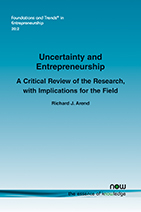Uncertainty and Entrepreneurship: A Critical Review of the Research, with Implications for the Field
By Richard J. Arend, L.L. Bean/Lee Surace Chair in Strategic Management, Professor of Business Administration, School of Business, College of Management & Human Service, University of Southern Maine, USA, richard.arend@maine.edu
Abstract
Uncertainty and Entrepreneurship provides a critical review of the uncertainty research, with implications for a field that has had an existential relationship with it ever since Knight’s clear delineation of the term as an essential wedge for new entry. We take a two-step approach in our literature review – where the objective facts are separated from the subjective interpretations – setting the new standard for such work. First, we provide the raw data taken directly from the hundreds of papers reviewed. This data is contextualized with definitions of key terms, the foundations of key concepts, and the limitations involved. Second, we provide our subjective analysis of that raw data. We assess the past research on uncertainty and its lack of evolution, discussing the theoretical and managerial implications. We find that much uncertainty-related alchemy exists – i.e., where a paper defines uncertainty as a condition that renders a focal decision unoptimizable, prior to it then suggesting a “new” optimization path. We make a clear and evidence-based case that the recent surge of such alchemy falls squarely on journal editors. We explain how this kind of misrepresentation of uncertainty has tarnished most of the recent theorizing in the field. As a result, we recommend significant changes.
Uncertainty and Entrepreneurship: A Critical Review of the Research, with Implications for the Field
Uncertainty and Entrepreneurship is a two-part literature review. Part I provides the objective facts supplementing the raw data taken directly from the papers reviewed with several necessary and preliminary contextual cues – definitions of key terms; the foundations of key concepts; and why it is important to review this literature on uncertainty specifically. The author also supplements the raw data with basic summaries – details on the process and on the quantified outcomes of the review. Part II provides the subjective analysis explaining the value of providing a scholarly interpretation of the review’s raw data. The author interprets the raw data summaries (e.g., over uncertainty definitions, types, measures, sources and treatments) in terms of what they mean for the field of entrepreneurship, speaking to the relevance of the past research on uncertainty and its evolution in entrepreneurship and beyond including theoretical and managerial implications. The monograph explains how the misrepresentation of uncertainty has tarnished most of the recent partial theorizing in the field. As a result, the author recommends a change of direction in entrepreneurship theorizing and concludes the two-part assessment of this literature with a call to action.

Online Appendix | 0300000119_app.pdf
This is the article's accompanying appendix.